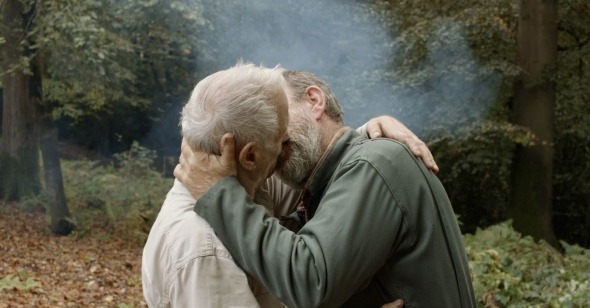The Man, the Myth
by Conor Williams
A Prince
Dir. Pierre Creton, France, Strand Releasing
Young, scruffy Pierre-Joseph has taken an interest in horticulture. “I was steered toward an apprenticeship,” he explains, through a voice that sounds older, gruffer—one of several voiceovers that make up the winding, tangled narrative roots in Pierre Creton’s A Prince. His father was a gunsmith, he says, and his mother a taxidermist. Perhaps turned off by the preoccupation with death in both of their trades, the young man, at the urging of his teacher, Mrs. Brown, chooses instead to cultivate nature.
“This boy literally fell into my lap,” says Alberto, one of Pierre-Joseph’s mentors. “He caught me unawares.” Mrs. Brown, on the other hand, looks after another young man referenced at the film’s start, Kutta, whom she has adopted. She thinks of him as a plant that she has uprooted from India, and reflecting on the bullying he receives from his classmates, she wonders if he actually takes some sort of pleasure in being humiliated. Meanwhile, throughout his studies, Pierre-Joseph manages to seduce just about anyone—his older teachers, and even his cousin. This bit of incestuous information is dropped casually into the voiceover. Pierre-Joseph’s mentors look a bit alike: older, white-haired daddies. In fact, almost all the male characters appear pretty much interchangeable—Pierre-Joseph, his cousin, and his friend Mino all look like variations on the same SCRUFF profile. The only character who looks markedly different is Kutta—but this will be addressed later.
Creton has made several films before this, blending fiction and nonfiction, and A Prince is no different. The film is based loosely on his own experiences as a young man. The filmmaker also works as a gardener, which adds authenticity to his portrayal of the natural world. What makes this film so perplexing is its heavily layered narrative. Pierre-Joseph is played by two separate people, first in his younger years by Antoine Pirrote, and then Pierre Creton, the director himself, in a cleverly simple temporal shift wherein Pirrote walks off screen and Creton enters to take his place. However, Pierre-Joseph is voiced throughout the film by a different person altogether, Grégory Gadebois. The same goes for Alberto, played by Vincent Barré and voiced by Mathieu Amalric. Manon Schaap plays Françoise Brown, but the character is voiced by Françoise Lebrun, and on top of that, Lebrun plays Pierre-Joseph’s mother. It’s not clear how this camouflage serves Creton’s film beyond complicating things for the sake of abstraction. These voiceovers give the film a fairly novelistic feeling, as if we are to read the film rather than watch it. Creton builds his characters up from the outside; they lack a real sense of interiority. Where A Prince thrives is in its lush cinematography, inviting the audience into cozy, well-worn interiors and verdant, rich landscapes. The film is entrancing, thanks to its earthy imagery and elegant score, and perhaps in part to the droning, intertwining voiceovers.
Toward the film’s end, Pierre-Joseph, now an older man, takes on a gardening job at a grand estate. As it turns out, this is where Kutta lives. He and Pierre-Joseph embrace upon meeting. “It’s strange to finally meet after all this time,” Pierre-Joseph says. “All what time?” responds Kutta. The two men feel as if they’ve known each other their whole lives. Kutta tells Pierre-Joseph that they should make a film together, that his estate would make a nice backdrop for a movie. He tells him about binge-watching Game of Thrones during his lonesome nights at the estate, that he feels addicted to heroic fantasies, but also to BDSM porn videos. Kutta was not just looking for any gardener but one who would whip him. It would seem his mother’s concerns about Kutta’s personality were not unfounded after all.
Some may take issue with Creton’s characterization of Kutta, objecting to what could be seen as fetishization of the only person of color in the film. However, the scene that follows, set to the strains of dark metal, goes beyond fetishization—Kutta is mythologized. He and Pierre-Joseph stand nude before the crackling fireplace. Pierre-Joseph looks down at Kutta’s crotch and finds something . . . otherworldly. Where Creton’s film has for the past hour been largely grounded in realism, if shrouded in narrative distancing, here it takes a big swing into surrealism. It’s unexpected and awesome. The shot in question is the best part of the film—it’s a shame that it takes so long to arrive at this risk. There’s a lot of potential laid out in the dark, erotic soil of the tantalizing, somewhat frustrating A Prince, but this reveal of Kutta’s power may leave viewers wanting more.
